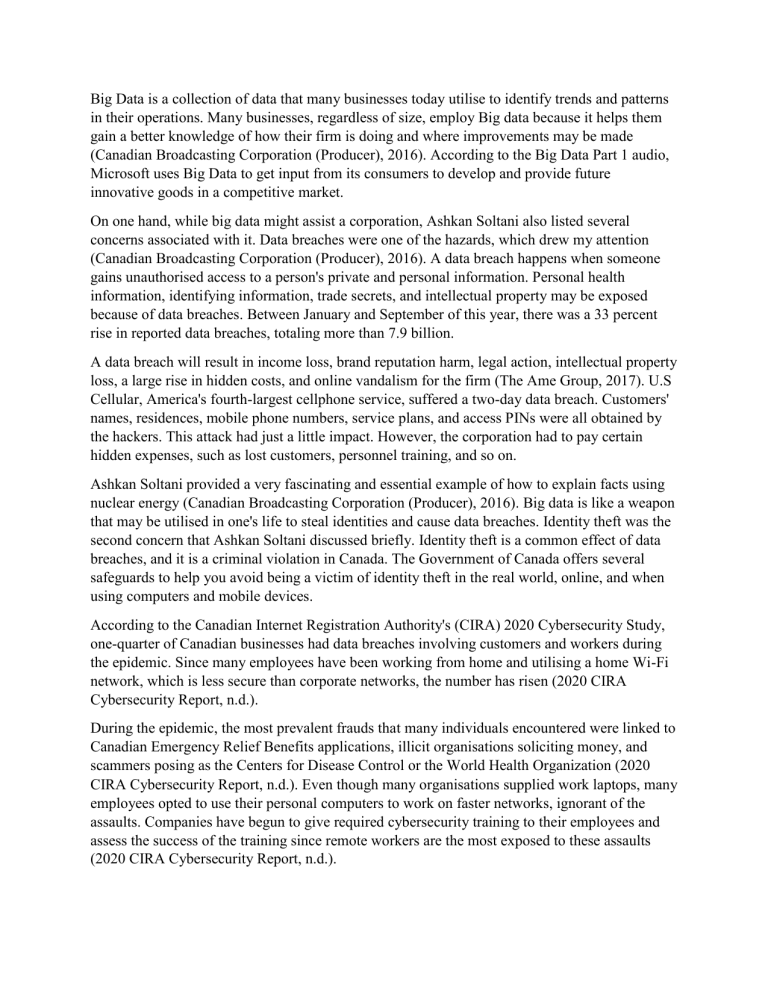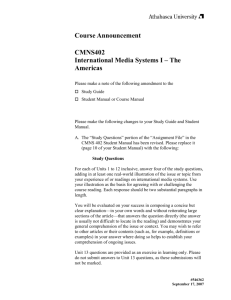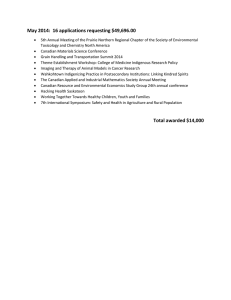
Big Data is a collection of data that many businesses today utilise to identify trends and patterns in their operations. Many businesses, regardless of size, employ Big data because it helps them gain a better knowledge of how their firm is doing and where improvements may be made (Canadian Broadcasting Corporation (Producer), 2016). According to the Big Data Part 1 audio, Microsoft uses Big Data to get input from its consumers to develop and provide future innovative goods in a competitive market. On one hand, while big data might assist a corporation, Ashkan Soltani also listed several concerns associated with it. Data breaches were one of the hazards, which drew my attention (Canadian Broadcasting Corporation (Producer), 2016). A data breach happens when someone gains unauthorised access to a person's private and personal information. Personal health information, identifying information, trade secrets, and intellectual property may be exposed because of data breaches. Between January and September of this year, there was a 33 percent rise in reported data breaches, totaling more than 7.9 billion. A data breach will result in income loss, brand reputation harm, legal action, intellectual property loss, a large rise in hidden costs, and online vandalism for the firm (The Ame Group, 2017). U.S Cellular, America's fourth-largest cellphone service, suffered a two-day data breach. Customers' names, residences, mobile phone numbers, service plans, and access PINs were all obtained by the hackers. This attack had just a little impact. However, the corporation had to pay certain hidden expenses, such as lost customers, personnel training, and so on. Ashkan Soltani provided a very fascinating and essential example of how to explain facts using nuclear energy (Canadian Broadcasting Corporation (Producer), 2016). Big data is like a weapon that may be utilised in one's life to steal identities and cause data breaches. Identity theft was the second concern that Ashkan Soltani discussed briefly. Identity theft is a common effect of data breaches, and it is a criminal violation in Canada. The Government of Canada offers several safeguards to help you avoid being a victim of identity theft in the real world, online, and when using computers and mobile devices. According to the Canadian Internet Registration Authority's (CIRA) 2020 Cybersecurity Study, one-quarter of Canadian businesses had data breaches involving customers and workers during the epidemic. Since many employees have been working from home and utilising a home Wi-Fi network, which is less secure than corporate networks, the number has risen (2020 CIRA Cybersecurity Report, n.d.). During the epidemic, the most prevalent frauds that many individuals encountered were linked to Canadian Emergency Relief Benefits applications, illicit organisations soliciting money, and scammers posing as the Centers for Disease Control or the World Health Organization (2020 CIRA Cybersecurity Report, n.d.). Even though many organisations supplied work laptops, many employees opted to use their personal computers to work on faster networks, ignorant of the assaults. Companies have begun to give required cybersecurity training to their employees and assess the success of the training since remote workers are the most exposed to these assaults (2020 CIRA Cybersecurity Report, n.d.). We have legislation on both the federal and provincial levels in Canada. The Personal Information Protection and Electronic Documents Act (PIPEDA) is a federal law that regulates how businesses utilise personal information. However, in certain jurisdictions, such as Alberta and British Columbia, the personal information protection act (PIPA) is applicable to the private sector. As a result, each province has its own set of privacy regulations. PIPA, which includes personal information such as phone numbers, home addresses, email addresses, and more, is followed in the case of BC. Employers are liable for any privacy violations committed by workers while on the job. All staff should be trained to ensure that they are aware of the privacy regulations. They should also update, establish, and execute appropriate policies and processes to secure personal information obtained from the general public in order to do business (Office of The Information & Privacy Commissioner for British Columbia, 2015). These safeguards will assist them in avoiding future disasters or catastrophes. It is critical to address this topic now and to equip all employees to protect themselves from data breaches and identity theft. REFERENCES 2020 CIRA Cybersecurity Report. (n.d.). Canadian Internet Registration Authority (CIRA). https://www.cira.ca/cybersecurity-report-2020 Canadian Broadcasting Corporation (Producer). (2016, October 9). Big Data, Part 1 [Audio File]. CBC Radio, Ideas. Retrieved from, http://www.cbc.ca/radio/ideas/big-data-part1-1.3640605 Office of the Information and Privacy Commissioner for B.C. | Home. (n.d.). Retrieved November 18, 2021, from https://www.oipc.bc.ca/ The Ame Group. (2017, December 13). Data Security Breach: 5 Consequences for Your Business. The AME Group. https://www.theamegroup.com/security-breach/

